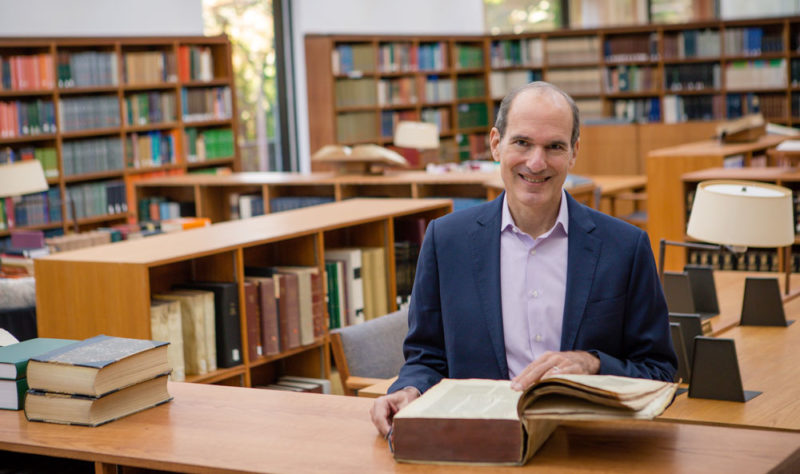
Stories

Photo: Andrea Kane
David Nirenberg Joins Rita Allen Foundation Board of Directors
David Nirenberg, Director and Leon Levy Professor at the Institute for Advanced Study, has been elected to the Rita Allen Foundation Board of Directors.
Nirenberg, whose term begins immediately, is a historian of society and ideas, an author and a public intellectual, and an academic leader advancing the ability of different disciplines to work in community and in collaboration with one another.
As a wide-ranging scholar, Nirenberg has addressed the interaction of Christians, Jews, and Muslims in medieval Europe and the Mediterranean, as well as how mathematical ideas have influenced claims of different forms of knowledge across history. His research traces the long history of ideas, providing insight into urgent issues of our time, including racism, Anti-Semitism, relationships across religions and cultures, and the powers and limits of the sciences and the humanities.
As Director of the Institute for Advanced Study, Nirenberg leads one of the world’s leading centers for basic research, renowned for scholarship in history, mathematics, natural sciences, and social science. He previously served at the University of Chicago in a number of influential roles—as founding Director of the Neubauer Collegium for Culture and Society; Dean of the Division of the Social Sciences; Deborah R. and Edgar D. Jannotta Distinguished Service Professor; Executive Vice Provost; and Interim Dean of the Divinity School. While Dean of the Division of the Social Sciences, he led efforts to create the Computational Social Science program and to establish the Center for International Social Science Research and the Committee on Quantitative Social Science.
“David’s ability to see and share remarkable connections across diverse disciplines has made him an internationally recognized leader, a shaper of ideas and institutions,” said Elizabeth Good Christopherson, President and Chief Executive Officer of the Rita Allen Foundation. “As the Rita Allen Foundation seeks to catalyze innovative approaches to entrenched and emergent problems, we are eager to engage with David and his wide-ranging expertise and perspectives in support of pioneering scholars, boundary-spanning leaders, and collaborative work to advance the public good.”
A member of the American Academy of Arts and Sciences and the Medieval Academy of America, Nirenberg’s books include Anti-Judaism: The Western Tradition, broadly considering the foundational role of anti-Judaism in the history of the West. Most recently, he co-authored with his father, the mathematician Ricardo Nirenberg, Uncountable: A Philosophical History of Number and Humanity from Antiquity to the Present, to explain how numbers came to occupy so many domains of knowledge.
“The Rita Allen Foundation is doing vital work in bringing knowledge and discovery to the many diverse audiences that can benefit from them,” said Nirenberg. “The connection between scholarly pursuit, civic engagement, and societal innovation feels more important every day, and I look forward to promoting this mission alongside my fellow board members.”
Nirenberg graduated with an A.B. (1986) from Yale University and earned his M.A. (1989) and Ph.D. (1992) in history from Princeton University.
He has received many prizes and honors, including the Historikerpreis from the city of Münster, the Laing Prize from University of Chicago Press, an honorary doctorate from the University of Haifa, the Ralph Waldo Emerson Prize from Phi Beta Kappa, the John Nicholas Brown Prize from the Medieval Academy of America, and the Herbert Baxter Adams Prize and Premio del Rey Prize from the American Historical Association.
About the Rita Allen Foundation
The Rita Allen Foundation is a venture philanthropy organization that invests in transformative ideas in their earliest stages to leverage their growth and promote breakthrough solutions to significant problems. The Foundation is developing new investments, research, and coalitions to strengthen civic science as a growing field of study and area of practice committed to ensuring that all people shape and benefit from science, technology, and innovation.
In addition, the Foundation invests in early-career biomedical scholars to do pioneering research, seeds innovative approaches to fostering informed civic engagement, and develops knowledge and networks to build the effectiveness of the philanthropic sector. The Foundation embraces learning through experimentation, network-weaving, bridge-building, and knowledge-sharing to advance the civic potential of diverse communities; philanthropy; science and technology for the public good.